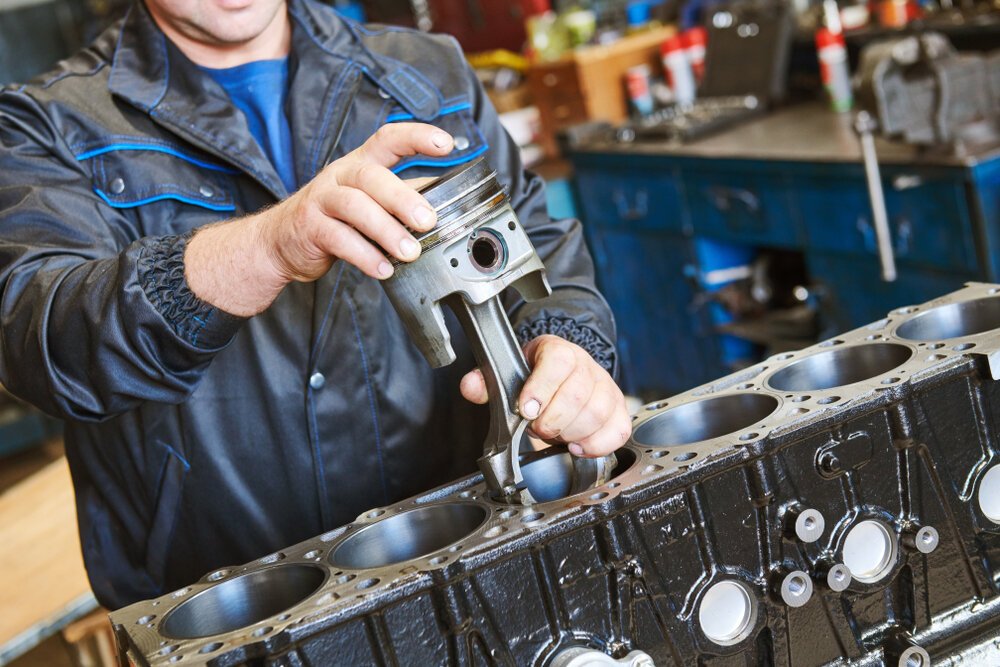Diesel engines are the backbone of many vehicles and machinery, from trucks and buses to farm equipment and generators. Their durability and efficiency make them a popular choice for heavy-duty applications. However, like any complex machine, diesel engines require regular maintenance and occasional repairs to ensure they continue to perform optimally. Understanding the basics of diesel engine repair is essential for anyone who relies on these engines for their daily operations. Proper maintenance can prevent costly breakdowns and extend the lifespan of your engine. This guide will walk you through the fundamental aspects of diesel engine repair, helping you identify common issues, understand repair techniques, and know when it’s time to seek professional help.
Understanding Diesel Engines
How Diesel Engines Work
Diesel engines operate on the principle of compression ignition, unlike gasoline engines that use spark ignition. In a diesel engine, air is compressed to a very high pressure and temperature, which causes the diesel fuel injected into the combustion chamber to ignite spontaneously. This process generates the power needed to drive the engine. Diesel engines are known for their fuel efficiency and torque, making them ideal for heavy-duty applications. They typically have fewer moving parts than gasoline engines, which can lead to greater reliability and longevity if properly maintained.
Common Components and Their Functions
A diesel engine comprises several key components, each playing a crucial role in its operation. The cylinder block houses the cylinders and the crankshaft, while the cylinder head contains the valves, camshaft, and injector nozzles. The fuel injectors deliver precise amounts of diesel fuel into the combustion chamber. The turbocharger increases the engine’s efficiency by forcing extra air into the combustion chamber. Additionally, the radiator helps cool the engine, and the oil pump ensures proper lubrication of moving parts. Understanding these components and their functions is vital for diagnosing and repairing engine issues effectively.
Common Diesel Engine Problems
Difficulty Starting
Difficulty starting a diesel engine can be caused by various issues. Common reasons include a weak or dead battery, clogged fuel filters, or problems with the fuel injection system. In colder climates, issues with glow plugs, which help preheat the combustion chamber, can also be a factor. Regularly checking and maintaining these components can help prevent starting problems. If the engine struggles to start, it’s essential to address the underlying issue promptly to avoid more significant damage.
Loss of Power
A noticeable loss of power in a diesel engine can be due to several factors, such as a clogged air filter, malfunctioning turbocharger, or issues with the fuel system. A reduction in power can affect the vehicle’s performance and efficiency, making it harder to perform tasks or maintain speed. Regular maintenance, including replacing air filters and ensuring the fuel system is clean, can help maintain engine performance. If the power loss persists, a thorough inspection may be required to identify and address the root cause.
Excessive Smoke
Excessive smoke from a diesel engine can indicate various problems. White smoke often points to incomplete combustion or a problem with the fuel system, while blue smoke can suggest oil burning or worn engine components. Black smoke typically indicates an overly rich fuel mixture. Identifying the color and type of smoke can provide clues about the underlying issue. Regularly servicing the engine and addressing any abnormal smoke can help maintain engine health and performance.
Unusual Noises
Unusual noises from a diesel engine can be alarming and may signal underlying issues. Common noises include knocking sounds, which may indicate problems with the fuel injection system or internal engine components. Rattling noises could be a sign of loose or damaged parts. It’s important to address any unusual noises promptly to prevent further damage. Regular inspections and maintenance can help identify and resolve potential issues before they become severe.
Diagnosing Diesel Engine Issues
Basic Diagnostic Tools
Diagnosing diesel engine issues requires specific tools to accurately identify problems. Basic diagnostic tools include a multimeter for electrical testing, a fuel pressure gauge to check fuel system pressure, and an OBD-II scanner to read error codes from the engine control unit. These tools help pinpoint issues with electrical components, fuel delivery, and engine performance. Having the right diagnostic tools and understanding how to use them effectively is crucial for accurate troubleshooting.
Step-by-Step Diagnosis Process
To diagnose diesel engine issues, start with a systematic approach. Begin by conducting a visual inspection of the engine and checking for obvious signs of wear or damage. Next, use diagnostic tools to test key components such as the battery, fuel system, and electrical connections. Check error codes from the OBD-II scanner to identify any system malfunctions. Based on the results, follow a logical troubleshooting process to isolate and address the problem. Keeping a detailed record of symptoms and tests can also help in diagnosing complex issues more effectively.
Essential Tools for Diesel Engine Repair
Commonly Used Tools
Effective diesel engine repair requires a range of tools. Essential tools include wrenches and sockets for loosening and tightening bolts, screwdrivers for adjusting and fixing components, and pliers for gripping and manipulating parts. A torque wrench is also important for ensuring bolts are tightened to the correct specifications. Additionally, having a compression tester and fuel injector tester can help diagnose engine performance issues. Investing in high-quality tools ensures accuracy and efficiency in repairs.
Why Having the Right Tools Matters
Having the right tools is crucial for successful Diesel Engine Repair. Using improper tools can lead to damaged parts, incorrect repairs, or safety hazards. Quality tools enhance precision, making it easier to diagnose and fix problems accurately. Additionally, the right tools can save time and reduce the risk of further damage to the engine. Regular maintenance of tools and keeping them organized also contributes to more efficient and effective repair work.
Basic Repair Techniques
Fixing Common Issues
Addressing common diesel engine issues involves several basic repair techniques. For starting problems, check and replace the battery, fuel filters, or glow plugs as needed. To resolve power loss, inspect and clean the air filter and check the turbocharger for proper operation. Excessive smoke may require adjusting the fuel mixture or replacing faulty injectors. Regularly performing these repairs and maintenance tasks helps keep the engine running smoothly and prevents minor issues from escalating.
Maintenance Tips to Prevent Problems
Preventive maintenance is key to avoiding diesel engine problems. Regularly change the engine oil and filters to ensure proper lubrication and clean fuel. Keep the air and fuel filters in good condition to maintain optimal engine performance. Check and replace worn or damaged components promptly to prevent further issues. Additionally, maintaining proper fluid levels and keeping the engine clean can help prevent problems and extend the lifespan of the engine. Following a scheduled maintenance plan ensures the engine remains in good working condition.
When to Seek Professional Help
Signs That Indicate You Need a Professional
While basic repairs and maintenance can be handled independently, certain signs indicate that professional help is needed. If you encounter persistent issues that cannot be resolved with standard troubleshooting, such as severe power loss, unusual noises, or persistent smoke, it’s time to consult a professional. Additionally, if you lack the necessary tools or expertise for complex repairs, seeking professional assistance is advisable. A qualified diesel engine mechanic can provide a thorough inspection and accurate diagnosis, ensuring the engine is repaired correctly.
How to Choose a Reliable Diesel Engine Mechanic
Choosing a reliable diesel engine mechanic involves several considerations. Look for a mechanic with experience and specialized knowledge in diesel engines. Check for certifications and reviews from previous customers to gauge their reputation and expertise. A good mechanic should provide clear explanations of the issues and offer transparent pricing for repairs. Additionally, consider their turnaround time and customer service quality. Selecting a reputable mechanic ensures that your diesel engine receives the best care and repairs, minimizing downtime and maintaining performance.
Preventive Maintenance Tips
Routine Checks and Services
Routine checks and services are essential for keeping a diesel engine in top condition. Regularly inspect the engine for leaks, cracks, and wear. Monitor fluid levels, including engine oil, coolant, and fuel, and top them up as needed. Perform scheduled oil changes and replace filters according to the manufacturer’s recommendations. Additionally, check the condition of belts, hoses, and electrical connections. Performing these routine checks helps catch potential issues early and ensures the engine operates efficiently.
Best Practices for Longevity
To maximize the longevity of a diesel engine, follow best practices for maintenance and operation. Avoid overloading the engine and operate it within the recommended performance parameters. Allow the engine to warm up before heavy use, especially in cold weather, to ensure proper lubrication and reduce wear. Regularly clean the engine and keep it free from debris. Follow the manufacturer’s maintenance schedule and use high-quality parts and fluids. Adhering to these practices helps prevent premature wear and extends the life of the engine.
Conclusion
In conclusion, understanding diesel engine repair and maintenance is crucial for anyone who relies on these engines for their work or daily activities. By familiarizing yourself with common issues, diagnostic techniques, and repair methods, you can address problems effectively and keep your engine running smoothly. Regular maintenance and timely repairs prevent costly breakdowns and ensure optimal performance. Remember, when in doubt or faced with complex issues, seeking professional assistance is always a wise choice. Keeping your diesel engine well-maintained not only enhances its efficiency but also extends its operational lifespan, ensuring reliable performance for years to come.




